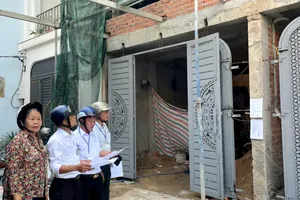
The statement was made by Director of the Population and Family Planning Division under the HCMC Department of Health Pham Chanh Trung.
Persistently lower fertility rate and population aging are considered two major challenges in the population sector of Ho Chi Minh City in recent years, significantly affecting the city’s socio-economic development in the future, Mr. Pham Chanh Trung told a reporter from SGGP Newspaper.
According to Mr. Trung, the city is seeking solutions to improve three current matters including improving the low birth rate, addressing the aging population and taking care of senior citizens’ health.
The current population of Ho Chi Minh City is 9,367,066 while the population density is 4,470 people per square kilometer. The fertility rate has fallen to an all-time low in the city with 1.39 children per woman. The current number of elderly people is 1,033,355, accounting for 11.03 percent of the total population, with an average life expectancy of 76.3 years.
Currently, the sex ratio at birth is 107-108 boys for every 100 girls. The city's fertility rate is continuously decreasing, from 1.76 children per woman of childbearing age to only 1.39 children per woman in 2022. Worse, Ho Chi Minh City is one of 21 localities with the lowest fertility in the country.
This is a big challenge for the future socio-economic development of Ho Chi Minh City. Moreover, it is increasingly popular that many couples decide to have one child while many young people have no plans to get married or to have a child today. This phenomenon is forecast to be an obstacle to the city's socio-economic development in the future.
First of all, the trend of couples having one child is now becoming popular in Ho Chi Minh City. In fact, there are many reasons why women hesitate to have children, especially a second child.
Besides, many couples tend to get married later or only having one child because they want to save more money and health to best care for their children. According to this trend, young couples, especially women, want to focus on improving their education, and professional capacity and seize opportunities for personal development.
Ho Chi Minh City is presently making efforts to gradually improve population quality. Specifically, the population sector is focusing on solving the following issues increasing the rate of young men and women participating in health checks before marriage, promoting prenatal and newborn screening programs, and maintaining a balance in the sex ratio at birth, raising people's awareness about low fertility and late marriage age, and care for the elderly in the southern metropolis.
These are considered key issues in improving the city's population quality at the present time. Ho Chi Minh City is also implementing the goal of improving the quality of the population in the early stages of life. Specifically, by 2022, the rate of pregnant mothers receiving prenatal screening will reach 86.3 percent and the rate of newborns being screened will reach 83.4 percent.
Ho Chi Minh City’s population entered the so-called ‘aging phase’ in 2017 onward and the population aging rate is very fast. This strong aged population is deeply influenced by low birth rates and constantly improving average life expectancy. For instance, in 2022, the average life expectancy of the city's residents was quite high around 76.3 years while the national life expectancy was about 73.6 years.
To solve the problem of population aging, the city's population sector is taking urgent measures and adapting solutions so that the elderly can live healthy and useful lives. Since mid-August 2023, Thu Duc City and districts in Ho Chi Minh City have piloted free health examination activities for the elderly in the area. Elderly people will be examined and have paraclinical tests, general ultrasound, and blood tests.
This program is part of the plan for health examination and early detection of non-communicable diseases in the elderly in Ho Chi Minh City in the period of 2024-2025 and the following years issued by the People's Committee of Ho Chi Minh City aiming to early detect and well control chronic diseases amongst senior citizens and saving treatment costs. In addition, communication activities about the elderly are also being promoted to change society's perception of elderly issues calling for the participation of the community, individuals and organizations in taking care of the elderly.
























